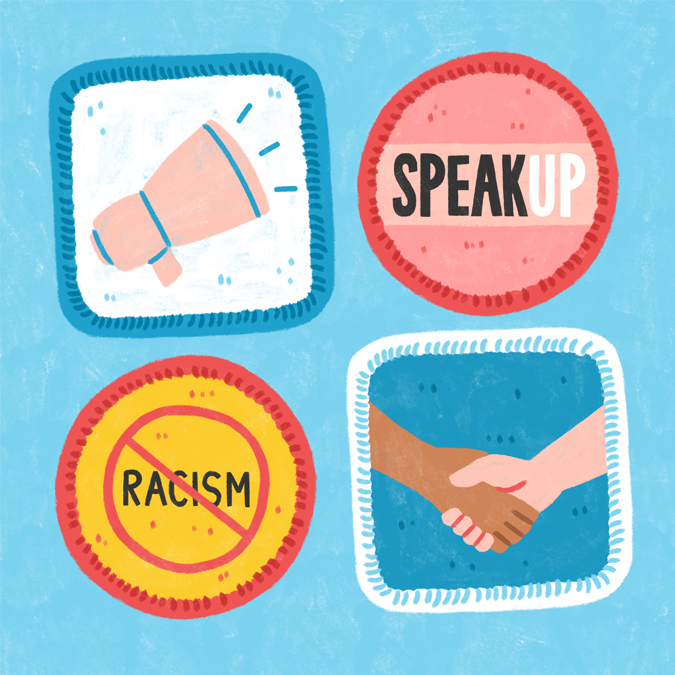
Six tips for confronting friends and family members with opposing—and oppressive—points of view
One night last fall, Alanna* stood at her parents’ sink, washing up after a family dinner party. Through the clanking of silverware, she heard snippets of a conversation her sister and brother-in-law were having in the living room, complaining about the changes to the neighbourhood with the arrival of new immigrant families. They were particularly incensed that the growing diversity at their kids’ school meant that the seasonal concert had become “The Holiday Concert” as opposed to “The Christmas Concert.”
Alanna got angrier and angrier as she listened. Finally, she decided to interject. “I asked my sister, ‘Has someone taken Christmas away from you? Who has deprived you of your right to celebrate Christmas?’” To Alanna’s surprise, her sister still felt her anger was justified, even after having been called out. “I was shocked that everyone didn’t fall over themselves to correct their comments and recognize the ridiculousness of what they were saying,” Alanna says.
At most family gatherings, she tries to avoid talking about anything weighty, just to keep the peace. But there are times when it’s really hard to keep quiet, especially when it comes to conversations with her sister. “I want to normalize something that isn’t normal to her,” Alanna says. “I want to show her that her view isn’t the only view.”
Rania El Mugammar, a Toronto-based anti-oppression and equity consultant, says the anticipation of having to spend time with bigoted family members or friends can cause a lot of angst. “People become really stressed out,” she says. “They become withdrawn, they cancel on their families—or they attend the event and end up arguing and having a really horrible time.”
EL Mugammar runs a workshop before every major holiday called “Shut It Uncle Bob: Talking to racist family, friends and loved ones,” which consistently sells out. She says the workshop’s popularity has a lot to do with the fact that many people want to confront racist behaviour, but just don’t have the tools.
Sound familiar? Here are El Mugammar’s top tips to help you tackle your “Uncle Bob” and engage in a meaningful conversation that might just broaden his perspective—and maybe even change his point of view.
1. Research your response
The offender is often the same person who says the exact same thing every single time. For that reason, says El Mugammar, it’s easy to prepare. Do your research about what this person is saying. Arrive at the event armed with stats, facts and anecdotes that disprove this particular viewpoint. Also, prepare for the confrontation emotionally, she says, so you won’t be easily thrown off kilter. “Our feelings are really important and are what guide us through this process, but they can also immobilize us.”
2. Define your goal
If you’re planning to prove to Aunt Know-It-All that you’re right and she’s wrong, you’ll likely come away disappointed. El Mugammar says that the goal should be a change in behaviour, not an overall victory. Think of this as the opportunity to plant a seed. “Being attached to being right means we’re not as empathetic or as willing to listen,” she says.

3. Whatever you do, don’t call people racist
If you come out of the gate wagging your finger and calling someone a racist, that person is going to feel labelled and attacked—and will be very unwilling to participate in a conversation about the harmful things they’re saying. “If they believe that that’s who you think they are, they’re going to feel no investment to change,” says El Mugammar. “The reality is that most people don’t think they’re racist.” Instead, she advises talking to the person about one specific thing—one behaviour or viewpoint—rather than their overall character or the way they always behave.
4. Know when to shut it down
Sometimes you just have to acknowledge that an individual isn’t willing to change, and you’ve done all you can to talk to them about it. Besides, there are some people who just love to antagonize and to bring up divisive subjects with the sole objective of pushing buttons. In these situations, you can set a firm boundary by saying something like, “You can’t say that around me or in my house.” Let them know you’re willing to restart the conversation when they’re ready to have a meaningful discussion about the issue.
5. Know thyself
Throughout the discussion, stay tuned in to your own body and watch for cues that you’re getting riled up. If your muscles are tensing and your face is getting hot, you may be veering into a territory where the conversation can turn from a place of productivity to defensiveness, or even aggression. Know what de-escalates you, like stepping outside for a breath of fresh air. There may also be times when you need to push pause. “In these instances, I’ll just say, ‘This is a really important conversation and one I want to have, but maybe we can revisit it at another time,’” says El Mugammar.
6. Don’t give up
Many of us fear conflict or worry about rocking the boat, especially when dealing with family dynamics. But El Mugammar says this isn’t a good enough reason to perpetually put off having difficult conversations. “Those who experience bias on a daily basis don’t get to opt out,” she points out.
If you’re really worried about creating conflict, find a way around it. Maybe that means confronting the individual privately, rather than in front of others. Or, talk to someone else who is closer to that person and ask them to have the conversation.

Why it’s important to speak up
Alanna dreads family gatherings and is thankful she only has to attend a couple a year. But regardless of this nervous anticipation, she feels strongly about carrying on with these conversations—without sabotaging the family meal. “I’m committed to moving the dialogue forward,” she says. “You can be a dissident, but you don’t have to ruin the dinner party.”
El Mugammar emphasizes how important this is. “We have to be able to do this hard work of confronting people who hold really oppressive views,” she says. “We have to be able to have these conversations and interrupt this behaviour, because this behaviour goes out into the world and causes real harm.”
* Last name has been omitted for privacy